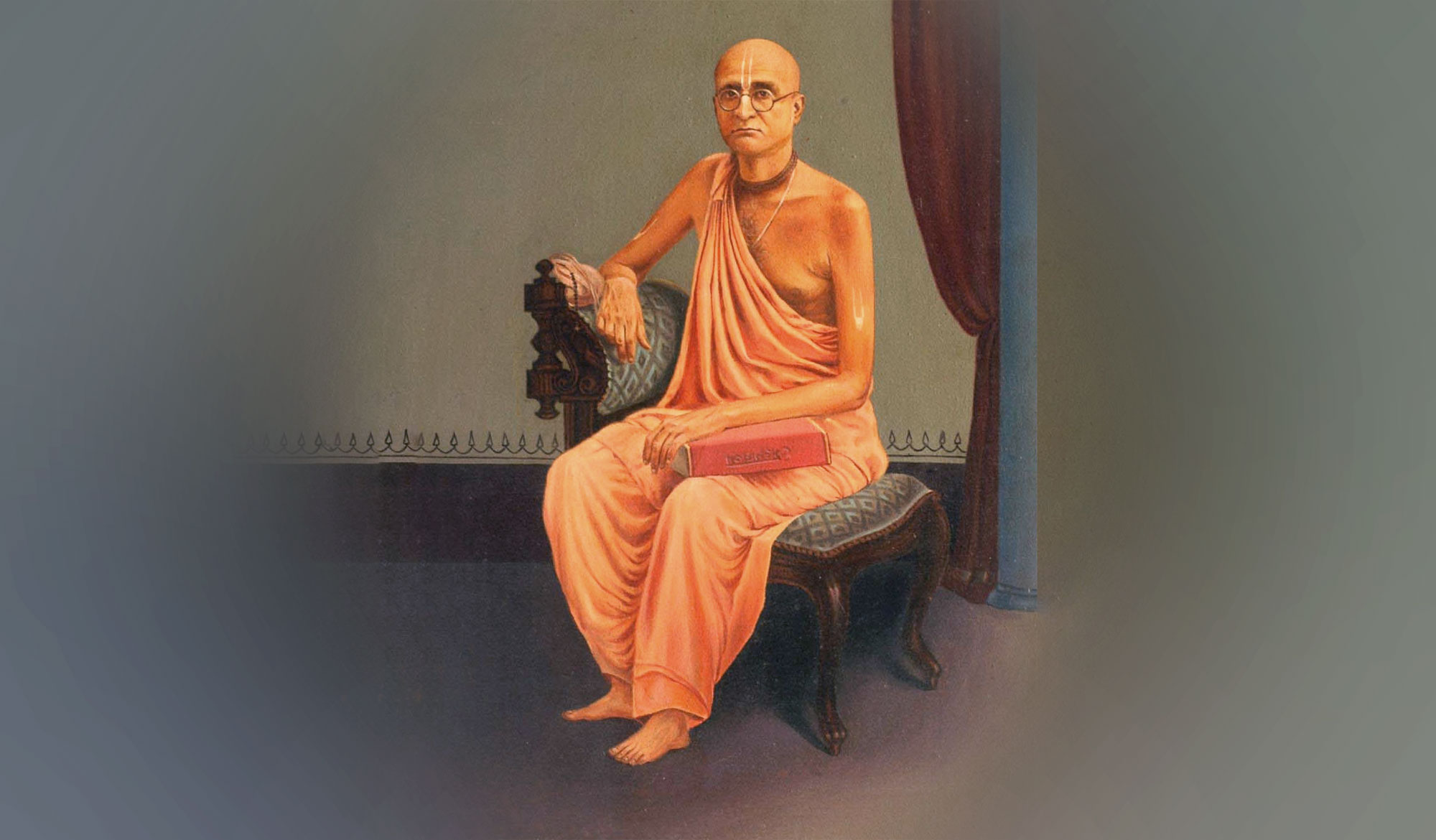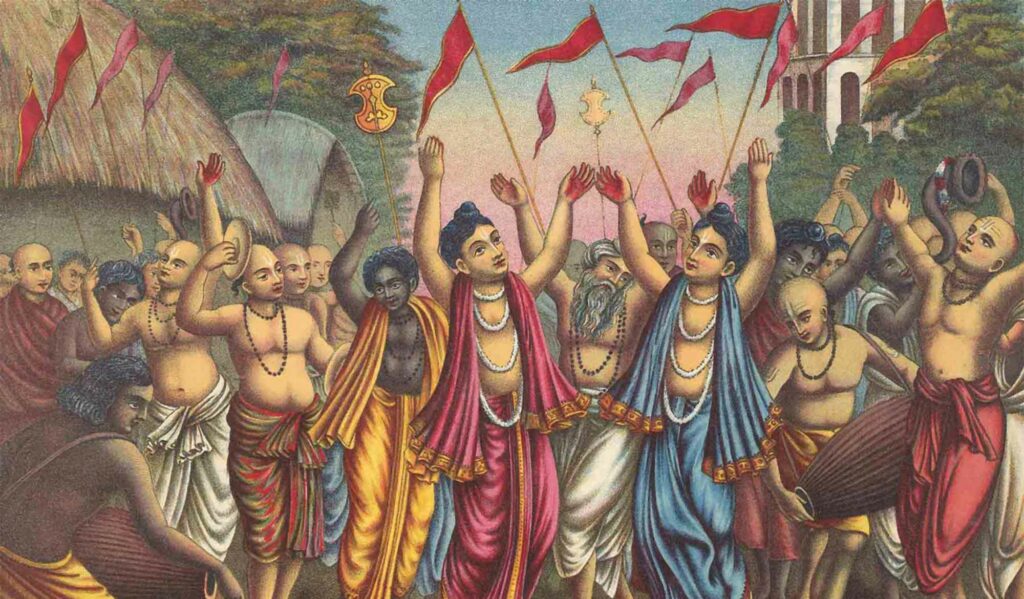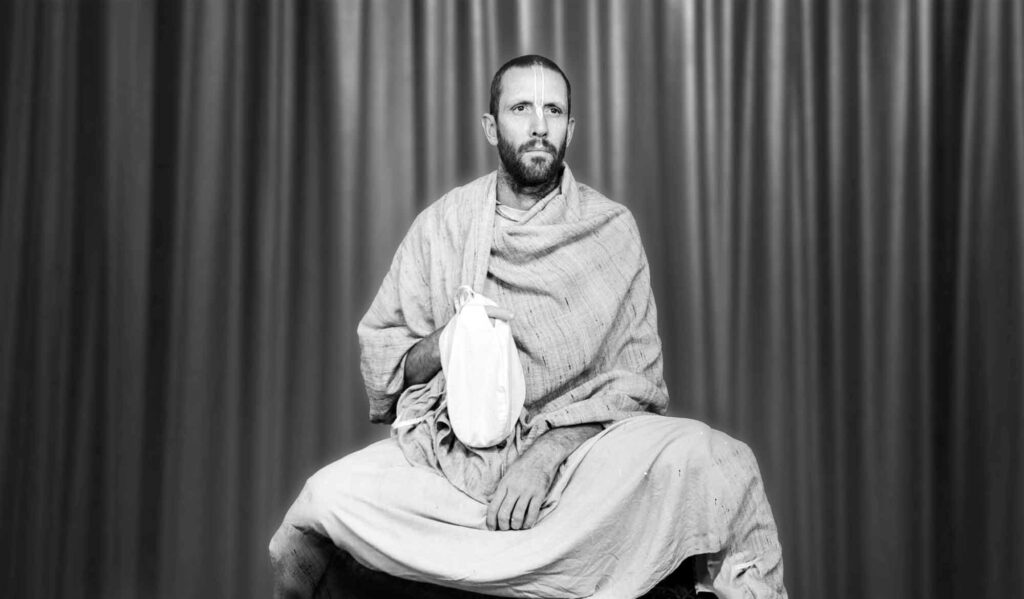Overview
This article ‘Guru-Bruva (The Pseudo-Guru)’ was first published in 1923 in The Gauḍīya Vol.2 Issue 5. Herein, Prabhupāda Śrīla Bhaktisiddhānta Sarasvatī Ṭhākura exposes the cheating business of imitation gurus who simply collect disciples for money and prestige. This Bengali article has been translated for the first time into English by Swami B.V. Giri and Sanātana Dāsa.
The saying, guru mile lakha lakha śiṣya nāhi mile eka (‘One can find millions of gurus, but it is hard to find even one disciple’) is used in favour of pseudo-gurus only. Otherwise, one does not find millions of proper gurus. ‘Pseudo-gurus’ refers to those who do not have the characteristics of a real guru, but identify themselves as gurus in order to gather disciples. This means the many worldly-minded people who are attached to their families that are busy satisfying their wives, sons and daughters, wandering in society in the guise of gurus, utilising their disciple’s wealth for their own sense-enjoyment and misguiding themselves and their loyal followers. Guru-tattva is an extremely high principle and is a heavy responsibility. However pseudo-gurus are very laghu (light) and they have no sense of responsibility. In the ordinary mundane world, for someone who accepts leadership over a few people, so much responsibility and so much competence is required to lead the people under him, otherwise all their activities will be in vain. It is a subject of great wonder that we are very much indifferent to the activities of paramārtha (the supreme goal), by which one takes shelter of the guru’s feet and takes dīkṣā which is so intimately connected to our eternal well-being. No one will admit that we will achieve special recognition for our intelligence if we are crossing a large river or ocean with turbulent waves, and we entrust the burden of steering the ship to the hands of an unfit, clumsy captain. And by placing the responsibility of crossing the ocean of saṁsāra, which is filled with various objects of enticement, in the hands of a pseudo-guru we think ourselves to be intelligent? What can be more astonishing than this?
Just as a boat should be kept under the supervision of a good captain, taking shelter at the feet of a sādhu-guru is absolutely necessary for one’s eternal well-being. There is no benefit in accepting a dishonest pseudo-guru as guru – it is harmful in all respects. A sādhu–guru is one who has himself attained the tattva-vastu (the supreme object of knowledge) and is able to help those who take shelter of him to attain it. In a mood of extreme humility taking shelter of the feet of Bhagavān, he attains peace by being freed from the dominance of the senses and mental agitation. He is expert in the conclusions of śāstra and adept in cutting asunder the doubts of the disciple.
In him there is no desire or endeavour signifying mundane enjoyment; he is always engaged in service to Bhagavān. In a mood of detachment, he serves the Lord with those things meant to be used in the service of Śrī Bhagavān, and is not preoccupied in enjoying them with the mentality of bhogya-buddhi (thoughts of material enjoyment). However, considering such things are of this world, he is not engaged in renouncing them either. He considers all material things of this world to be worthy of service to Bhagavāṇ and constantly engages them in the service of Śrī Hari. Pseudo-gurus, on the other hand, are only busy enjoying them, or by renouncing them they become averse to establishing a relationship with Bhagavān. Their shelter is especially a hindrance to our eternal welfare, in other words to the establishment of one’s sva-svarūpa (intrinsic spiritual identity) and the attainment of eternal service to Bhagavān. Therefore those who altogether invoke inauspiciousness by taking shelter of them are not praised for their good intellect by pure devotees. Their intelligence is dishonest.
One who is a sad–guru is himself connected to a sad–guru through the āmnāya–paramparā (succession of divine knowledge), and the eternal associates of the Lord also have shown the exclusive suitability of taking shelter at the feet of a sad–guru. Even Bhagavān Śrī Śrī Gaurahari Himself, who is non-different from Vrajendra-nandana, connected with Śrīpāda Īśvara Purī and accepted the Śrī Madhva sampradāya, and by doing so, have again placed a shining example in front of the world of the ideal of the absolute necessity of the disciplic succession. Wherever that system of the āmnāya–paramparā, or the guru–praṇālī, is mentioned, it refers to the place where, on the basis of the succession of paramparā from Śrī Bhagavān Nārāyaṇa – that truth which is devoid of any falsehood (nirasta-kuhaka) is passed down through the descending process. If someone invents a new process with their crooked intelligence by changing, exaggerating or refining that eternal truth, then in that place the object of truth becomes distorted. Essential spiritual reality (vastava–vastu) cannot be found under the shelter of such pseudo-gurus, only temporary material gains (avastava–vastu) become the results of one’s fortune. Novel rhymes consisting of the Holy Names, new brands of gaurāṅga-nāgarī philosophy, processes of bhajana polluted with unconventional attire for women, disrespect for proper conduct in the guise of liberalism, maintaining disciples for the appeasement of one’s senses etc. – the initiator of all these, the pseudo-guru and his followers, must be rejected considering them as spiritually corrupt association, otherwise we will never be able to find the path of eternal auspiciousness. Some pseudo-gurus, pretending to possess a liberal mindset, consider keeping a śikhā, applying tilaka, wearing neck beads and other things befitting the dress of a Vaiṣṇava’s servant, to be inessential and do not care to accept them. Nor does he think it is necessary to stop the disciple from violence to other creatures and explain to him the necessary duty of serving bhāgavat-prasāda. All these pseudo-gurus who encourage misconduct are busy entertaining disciples and are dependent on them for their maintenance.
Thus they lack the proper detachment necessary to guide a disciple on the right path. They are devoid of the proficient age-old characteristics of detachment found in a devotee sādhu. Again, over and above that, by making all those dishonest disciples as their guru, they further degrade as a result of their association.
Some pseudo-gurus are seen by the people to be protecting social customs and thus they do not categorise them as corrupt. But there is another class of pseudo-gurus who violate social rules and engage in various vices, which they have been propagating as ‘bhajana.’ Those persons with bad character and an addiction to evil deeds are also respected in some places amongst society. Even if this does not go to such an extent, still he gets indulgence and it is a subject of immense grief to a socially responsible person. Society should not promote all these vices in any way, as being part of bhajana.
Those who desire the supreme goal of life should endeavour with all care wholeheartedly in every way to give up all connection with the company of pseudo-gurus, and have a blessed life in the shelter of the feet of a sādhu-guru. This is our only earnest proposal to the good-hearted readers. By this we will also be blessed and our service to the Śrī Gauḍīyas will be successful.
guror apy avaliptasya kāryākāryam ajānataḥ
utpatha-pratipannasya parityāgo vidhīyate
“It is one’s duty to give up a guru who cannot teach the disciple what he should do and what he should not do, and who takes the wrong path, either because of bad association or because he is opposed to Vaiṣṇavas.” (Mahābhārata, Udyoga-parva 179.25)
avaiṣṇavopadiṣṭena mantreṇa nirayaṁ vrajet
punaś ca vidhinā samyag grāhayed vaiṣṇavād guroḥ
“One goes to hell if he accepts mantras from an avaiṣṇava-guru, that is, one who is associating with women, and who is devoid of kṛṣṇa-bhakti. Therefore, according to the rules of śāstra, one should take mantras again from a Vaiṣṇava guru.” (Hari-bhakti-vilāsa 4.144)
yo vyaktir nyāya-rahitam anyāyena śṛnoti yaḥ
tāv ubhau narakaṁ ghoraṁ vrajataḥ kālam akṣayam
“He who poses as an ācārya, but gives false instructions that are opposed to the sattvata-śāstras, will reside in a terrible hell for an unlimited period of time, and so will the misguided disciple who mistakenly listens to such a false guru.” (Hari-bhakti-vilāsa 1.62)
Related Articles
- 📖 Prabhupāda Vijaya (Book)
- 📖 The Authorized Sri Caitanya Saraswata Parampara (Book)
- Guru-Bruva (The Pseudo-Guru) by Śrīla Bhaktisiddhānta Sarasvatī Ṭhākura
- Guru-tyāgī, Guru-bhogī and Guru-drohī by Swami B.V. Giri
- Who is Qualified to Succeed the Ācārya? by Śrīla Bhakti Rakṣaka Śrīdhara Mahārāja
- Deviations of the Ācārya by Śrīla Bhakti Rakṣaka Śrīdhara Mahārāja
- Śrīla Prabhupāda – in a Class by Himself? by Śrīla Bhakti Gaurava Narasiṅgha Mahārāja
- Big Fish in a Small Pond by Śrīla Bhakti Gaurava Narasiṅgha Mahārāja
- Guru-pādāśraya by Śrīla Bhakti Gaurava Narasiṅgha Mahārāja
- Can the Guru Make Mistakes? by Śrīla Bhakti Gaurava Narasiṅgha Mahārāja
- Change, Change, Change! by Śrīla Bhakti Gaurava Narasiṅgha Mahārāja
- Śrīla Prabhupāda – A Second Generation Devotee’s Perspective by Gaura Gopāla Dāsa
- The Change Disease by Gaura Gopāla Dāsa
Further Reading
Prema Dhāma Deva Stotram with the Narasiṅgha Sevaka Commentary – Verses 61-65
In verses 61 to 65 of 'Prema Dhāma Deva Stotram', Śrīla Śrīdhara Mahārāja narrates the pastime of Śrī Caitanya at Caṭaka Parvata In Purī and explains how the scriptures produced by Brahmā and Śiva are ultimately searching for the personality of Mahāprabhu who is merciful too all jīvas, no matter what their social position.
Prabhupāda Śrīla Sarasvatī Ṭhākura’s Visit to Ayodhyā
With the forthcoming observance of Śrī Rāma Navamī, we present 'Prabhupāda Śrīla Sarasvatī Ṭhākura’s Visit to Ayodhyā' written by Śrīla Bhaktisiddhānta Sarasvatī Ṭhākura Prabhupāda from The Gaudīyā magazine, Vol 3. Issue 21/ In December 1924, after visiting Benares and Prāyāga, Sarasvatī Ṭhākura visited the birth-site of Śrī Rāmācandra in Ayodhyā.
Śaraṇāgati – The Only Path to Auspiciousness
In this article, 'Śaraṇāgati - The Only Path to Auspiciousness', Dhīra Lalitā Dāsī analyses the process of śaraṇāgati (surrender) beginning with śraddhā (faith). She also discusses the role of śāstra and the Vaiṣṇava in connection with surrender.
Ātma Samīkṣā – The Value of Introspection
In this article, "Ātma Samīkṣā – The Value of Introspection" Kalki Dāsa highlights the importance of introspection in the life of a devotee and especially in relation to the worldly environment that surrounds us. He also explains how transcendental sound influences our capacity to introspect.
Prema Dhāma Deva Stotram with the Narasiṅgha Sevaka Commentary – Verses 61-65
In verses 61 to 65 of 'Prema Dhāma Deva Stotram', Śrīla Śrīdhara Mahārāja narrates the pastime of Śrī Caitanya at Caṭaka Parvata In Purī and explains how the scriptures produced by Brahmā and Śiva are ultimately searching for the personality of Mahāprabhu who is merciful too all jīvas, no matter what their social position.
Prabhupāda Śrīla Sarasvatī Ṭhākura’s Visit to Ayodhyā
With the forthcoming observance of Śrī Rāma Navamī, we present 'Prabhupāda Śrīla Sarasvatī Ṭhākura’s Visit to Ayodhyā' written by Śrīla Bhaktisiddhānta Sarasvatī Ṭhākura Prabhupāda from The Gaudīyā magazine, Vol 3. Issue 21/ In December 1924, after visiting Benares and Prāyāga, Sarasvatī Ṭhākura visited the birth-site of Śrī Rāmācandra in Ayodhyā.
Śaraṇāgati – The Only Path to Auspiciousness
In this article, 'Śaraṇāgati - The Only Path to Auspiciousness', Dhīra Lalitā Dāsī analyses the process of śaraṇāgati (surrender) beginning with śraddhā (faith). She also discusses the role of śāstra and the Vaiṣṇava in connection with surrender.
Ātma Samīkṣā – The Value of Introspection
In this article, "Ātma Samīkṣā – The Value of Introspection" Kalki Dāsa highlights the importance of introspection in the life of a devotee and especially in relation to the worldly environment that surrounds us. He also explains how transcendental sound influences our capacity to introspect.








